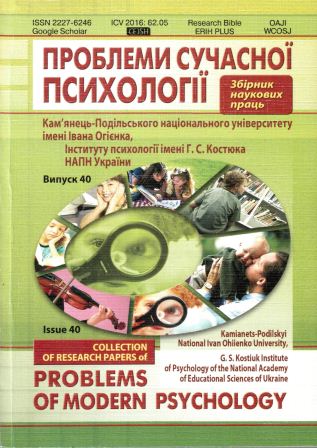Мотиваційна регуляція процесу становлення професійного образу «Я» у майбутніх психологів
DOI:
https://doi.org/10.32626/2227-6246.2018-40.331-343Keywords:
мотивація, особистість, студент, розвиток, особистісна зрілість, навчання, становлення професійного образу «Я», самоконтроль, творча активність, механізм поведінки.Abstract
Автором констатовано, що мотивація разом із соціальними детермінантами поведінки виступає стимулом трудової діяльності. Показано, що мотивація є складним соціально-психологічним механізмом, за допомогою якого співвідносяться зовнішні та внутрішні чинники регуляції поведінки в умовах становлення професійного образу «Я». З’ясовано, що мотивація забезпечує розвиток творчої активності особистості. Доведено, що мотиваційні характеристики ніколи не виступають ізольовано, тому що творча активність студентів формується і виявляється в діяльності як складна інтегральна освіта, як синтез різнопланових властивостей, де мотиваційні й особистісні інтелектуальні характеристики спрацьовують у реальній поведінці як єдиний психологічний механізм. Резюмовано, що мотивація у процесі становлення професійного образу «Я» студентів виступає як той своєрідний механізм поведінки, що зумовлює міру цілеспрямованості професійної поведінки. Зроблено висновок, що успішність становлення професійного образу «Я» пов’язана з такими якостями студентів, як адекватна самооцінка, розвинений самоконтроль і внутрішній локус контролю, сформована мотивація учіння, ефективність психологічного захисту, тобто якостями, що характеризують особистісну зрілість, ви-значають у процесі навчання професії формування цілісної структури професійного образу «Я» особистості студента.
References
Вірна Ж. П. Мотиваційно-смислова регуляція у професіоналізації психолога : монографія / Ж. П. Вірна. – Луцьк : РВВ «Вежа» Волин. держ. ун-ту ім. Лесі Українки, 2003. – 319 с.
Разорина Л. М. Соотношение мотивации и представлений студентов университета о будущей профессиональной деятельности : дис. … канд. психол. наук : 19.00.07 / Лариса Михайловна Разорина. – М., 2000. – 143 с.
Уотсон Дж. Б. Бихевиоризм / Дж. Б. Уотсон, Э. Торндайк. – М., 1999.
Чирков В. И. Самодетерминация и внутренняя мотивация поведения человека / В. И. Чирков // Вопросы психологии. – 1996. – № 3. – С. 116–133.
Чугунова Э. С. Связь профессиональной мотивации и творческой активности инженеров / Э. С. Чугунова // Вопросы психологии. – 1986. – С. 136–142.
Якимова П. Ю. Мотивация обучения и выбора профессии у студентов-психологов, обучающихся на разных психологических специальностях / П. Ю. Якимова // Психологическая наука и образование. – 2008. – № 5. – C. 110–119.
Amabile T. M. The social psychology of creativity / T. M. Amabile. – N. Y. : Springer-Verlag, 1983.
Grolnick W. S. The inner resources for perceptions of their parents / W. S. Grolnick, R. M. Ryan, E. L. Deci // Educat. Psychol. – 1991. – V. 83. – P. 508–517.
Koestner R. Setting limits on children’s behavior: The differential effects of controlling versus informational styles on intrinsic motivation and creativity / R. Koestner et al. // Pers. Soc. Psychol. – 1984. – V. 52. – P. 233–248.
Mossholder K. M. Effects of externally mediated goal setting on intrinsic motivation: A laboratory experiment / K. M. Mossholder // Applied Psychol. – 1980. – V. 65. – P. 202–210.
Pittman T. S. Intrinsic and extrinsic motivational orientations: Reward-induced changes in preference for complexity / T. S. Pittman, J. Emery, A. K. Boggiano // Pers. Soc. Psychol. – 1982. – V. 42. – P. 789–797.
Reeve J. Understanding motivation and emotion / J. Reeve. – Orlando, FL : Harcourt Brace College Publ, 1992.
Rigby C. S. Beyond the intrinsic-extrinsic dichotomy: Self-determination in motivation and learning / C. S. Rigby et al. // Motivation and Emotion. – 1992. – V. 16. – № 3. – P. 165–185.
Ryan R. M. Perceived locus of causality and internalization: Examining reasons for acting in two domains / R. M. Ryan, J. P. Connell // Pers. Soc. Psychol. – 1989. – V. 57. – P. 749–761.
Ryan R. M. Emotions in nondirected text learning / R. M. Ryan, J. P. Connell, R. W. Plant // Learn. Individ. Differences. – 1990. – V. 2. – P. 1–17.
Ryan R. M. Origins and pawns in the classroom: Self-report and projective assessment of individual differences in children perception / R. M. Ryan, W. S. Gronlick. – Unpubl. ms. Rochester Univ., 1984.
Downloads
Published
How to Cite
Issue
Section
License
Copyright
The Editorial Board has the full right to publish original scientific papers containing results of theoretical and experimental research works which are not currently subject to review for publication in other scientific editions. The Author shall transfer to the editorial board of the Collection the right to spread the electronic version of the paper, as well as the electronic version of the paper translated into English (for papers originally submitted in Ukrainian and Russian) by all kinds of electronic means (placement at the official website of the Collection, electronic databases, repositories etc).
The Author of an article reserves the right to use materials of the paper, without approval with the editorial board and the founders of this Collection: a) partially or fully, for educational purposes; b) for writing own dissertation papers; c) for preparation of abstracts, conference reports and presentations.
The Author of an article can place electronic copies of the paper (including the final electronic version downloaded from the official website of the Collection) at:
- personal web resources of all Authors (websites, webpages, blogs etc.);
- web resources of the institutions where the Authors are employed (including electronic institutional repositories);
- non-profit public access web resources (for example, arXiv.org).
But in all cases, it is obligatory to have a bibliographic reference to the paper, or a hyperlink to its electronic copy placed at the official website of this Collection.






